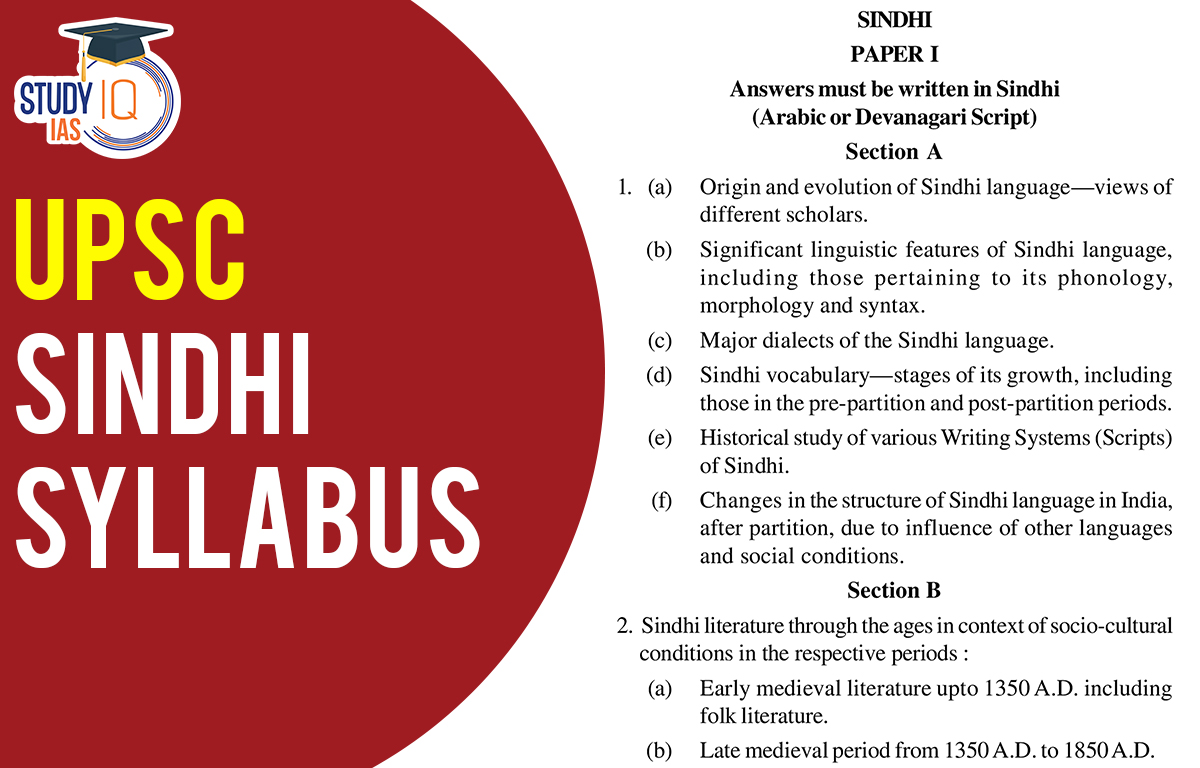Table of Contents
The Union Public Service Commission (UPSC) offers Sindhi Literature as an optional subject in the Civil Services Examination (CSE) Mains. Aspirants who have a strong command of the language and a deep understanding of Sindhi literature can choose this subject to gain an edge in the exam. This article provides the detailed syllabus for UPSC Sindhi Literature for IAS Mains 2025 along with a PDF download link.
Why Choose Sindhi Literature as an Optional Subject?
- Scoring Potential – Sindhi Literature is a high-scoring optional subject if prepared well.
- Static Syllabus – Unlike subjects like General Studies, the syllabus remains unchanged over the years.
- Interest-Based – If you have a passion for Sindhi literature, it can be an enjoyable and engaging subject.
- No Overlap with GS Papers – Although it does not overlap with General Studies, it offers a literary and cultural perspective.
UPSC Sindhi Syllabus
The UPSC Civil Services Examination is divided into three stages: preliminary, mains, and interview. For the UPSC IAS mains exam, candidates must select one optional Subject. It is very important in determining an aspirant’s ranking in the IAS exam. Current statistics indicate that the success rate of Literature disciplines is increasing with time.
There are 23 literary disciplines and 25 non-literary subjects on the UPSC list of optional subjects. This list includes the Sindhi literature option as one of the UPSC Mains optionals.
The complete UPSC Sindhi Literature Syllabus for the Civil Services Exam is provided for you in this article. This article provides you with complete information regarding the UPSC Sindhi Literature Syllabus that’s required to prepare for the UPSC Syllabus.
UPSC Sindhi Literature Syllabus
Sindhi is one of the 22 languages recognised by the Indian Constitution. It originated in undivided India’s Sindh area and has a huge number of speakers spread across the country. Gujarat, Rajasthan, and Maharashtra are the major states with a substantial number of Sindhi speakers.
Sindhi literature has a long literary history. Religious, philosophical, and scientific books are among the Sindhi works. Sindhi is written in both Devanagari and Persian scripts for the civil services examination. Candidates who have studied Sindhi in formal schooling or as their native language can choose this topic to perform well in the Mains exam. The UPSC syllabus includes Sindhi literature from the mediaeval to the present periods.
| UPSC Sindhi Optional Syllabus | Topics |
| Paper 1 | Origin and evolution of Sindhi language
Significant linguistic features Major dialects Sindhi vocabulary Historical study of various Writing Systems (Scripts) Changes in the structure of the Sindhi language in India Sindhi literature in the context of socio-cultural conditions in the respective periods |
| Paper 2 | Poetry
Drama Novel Short Stories Essays Criticism Autobiography Biography |
UPSC Sindhi Literature Syllabus PDF
Candidates can download the official UPSC Sindhi Literature syllabus PDF from the UPSC website or the direct link below:
Download UPSC Sindhi Literature Syllabus PDF
How to Prepare for UPSC Sindhi Literature Optional?
1. Understand the Syllabus & Exam Pattern
- Read and analyze the entire syllabus thoroughly.
- Familiarize yourself with the weightage of topics.
2. Read Standard Books & Reference Materials
- For Paper I:
- “A History of Sindhi Literature” – Motilal Jotwani
- “Sindhi Boli-a jo Tarikh” – Dr. H.T. Lakhani
- For Paper II:
- “Shah Jo Risalo” – Shah Abdul Latif Bhittai
- “Sindhi Kahaniyan” – Krishna Khatwani
- “Zindagi-a jea Pankhi” – Popati Hiranandani
3. Practice Answer Writing
- Analyze previous years’ question papers.
- Focus on structured and analytical answers.
4. Revise Regularly
- Make concise notes.
- Practice self-assessment tests.
5. Take Mock Tests
- Attempt test series to enhance your speed and accuracy.
- Seek expert feedback for improvement.


 AI Maker Labs: A Promise to build AI in ...
AI Maker Labs: A Promise to build AI in ...
 Daily Quiz 15 April 2025
Daily Quiz 15 April 2025
 How RBI Responded To Global Trade War Ch...
How RBI Responded To Global Trade War Ch...





















